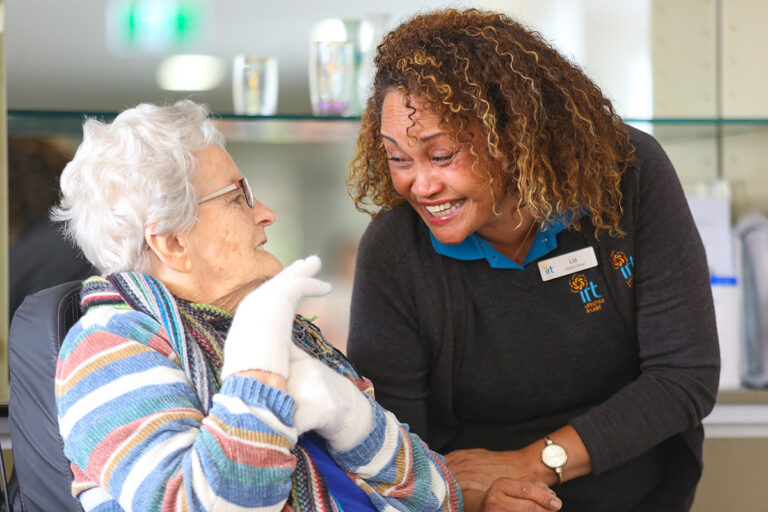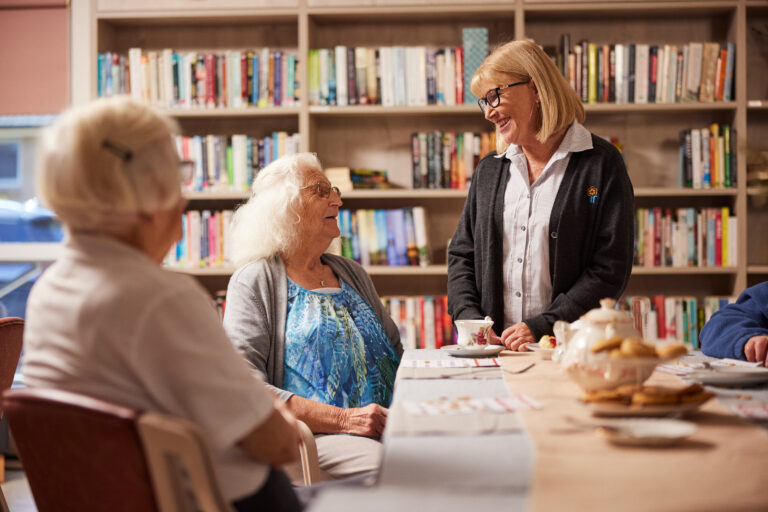50 purposeful activities for people living with dementia
For the estimated 447,000 Australians who live with dementia, it can be difficult to perform activities they may once have loved. Lack of stimulation and boredom can exacerbate the frustration of a person living with dementia, so it’s important to find activities that engage them and bring pleasure to their everyday lives.

As human beings, we engage in activities each and every day that provide us with purpose and pleasure. Things that stimulate our minds, and bring us enjoyment. These activities are different for each of us – baking, reading, knitting, climbing mountains, jumping out of aeroplanes…
But for the estimated 447,000 Australians who live with dementia, it can be difficult to perform activities they may once have loved, even though the need to do so has not been diminished. Lack of stimulation and boredom can exacerbate the frustration of a person living with dementia, so it’s important to find activities that engage them and bring pleasure to their everyday lives.
This will be different for each person, as we all have a unique set of likes and dislikes based on our history, lived experiences, emotions and personalities - it is not a ‘one size fits all’ scenario.
Firstly, some tips on planning activities:
1. Understand the person
If you don’t already, find out their cultural background, family history, job history, interests and significant life events. This will allow you to…
2. Tailor activities to suit them
A former farmer may enjoy gardening, for example.
3. Avoid over-stimulation
Many people with dementia find large crowds and loud noises overwhelming.
4. Look to daily life for inspiration
Not all activities require planning and lots of materials. Things we do as part of daily life can be challenging and stimulating for someone with dementia, such as brushing their teeth or setting the table.
5. Tap into memories
“For many people with dementia, a sense of movement and rhythm is often retained. Listening to music, dancing, or contact with babies, children or animals provide positive feelings. People with dementia often have excellent memories of past events, and looking through old photos, memorabilia and books can help the person to recall earlier times.” BetterHealth Channel
6. Simple is best
Allow plenty of time and space, focus on one thing at a time, and break down activities into manageable steps. You might not get it right the first time – either under or overestimating the person’s abilities, but you’ll soon get a feel for what will work for them.
7. Prepare the work area
Clutter, noise and distractions can wreak havoc on the perception and coordination of someone with dementia, so find a clean, safe work surface. You may also need to play around with work heights and seat preferences.
8. If it’s not working, don’t sweat
Abilities and tolerances can very day-to-day. Don’t take it personally if an activity isn’t working – try it again tomorrow or just abandon ship.
9. Pick your timing
This comes with knowing the person. When are they at their best? Mornings, afternoons, evenings? Early birds may enjoy a morning stroll, while those who get restless late in the day may benefit from filling that time with a late afternoon walk.
10. Consistency is important
Learn from your mistakes and keep notes if required, especially if more than one person cares for the person. When you find something that works, repeat it and build on it.
Here are 50 purposeful activities that people who live with dementia may enjoy doing with the people who love and care for them.
Not all activities will suit everyone – it will depend on their stage of dementia, as well as their personal likes and dislikes:
Day-to-day activities:
1. Fold towels or napkins
2. Pair socks
3. Set the table
4. Brush your teeth
5. Make the bed
6. Sweep the floor
7. Prepare breakfast, lunch or dinner
8. Wash and dry the dishes
Outdoor activities
9. Take a walk
10. Plant some flowers or vegetables
11. Water plants
12. Mow the grass
13. Go to the park
14. Sit on a bench and watch the world go by
15. Throw or kick a ball
16. Go to the beach
17. Visit a National Park
18. Rake leaves
19. Have a picnic
20. Go fishing
21. Go swimming or take an aqua aerobics class
22. Feed some ducks

Indoor activities
23. Listen to music
24. Dance
25. Knit
26. Colour-in
27. Do chair yoga
28. Look at family photos
29. Watch a game of sport
30. Play with play-doh
31. Play a board or card game – checkers, chess, snakes and ladders, Connect 4, dominoes, memory cards
32. Read a magazine or the newspaper
33. Do a jigsaw puzzle
34. Cook or bake something
35. Do chair dancing
Sensory activities
36. Sort pegs by colour
37. Sew some buttons onto a ribbon
38. Finger paint
39. Untie knots
40. Match up nuts and bolts, or tighten screws
41. Open and close padlocks
42. Toss some sensory bean bags made of different materials with rice, sand and grains to each other
43. Make a bead necklace
44. Smell fresh flowers
45. Use essential oils and fragrances
46. Stroke an animal or differently textured materials
47. Rummage in a box containing things the person is interested in
Do something personal:
48. Give a hand massage
49. Brush their hair
50. Give a manicure/pedicure

Aged care services with IRT
IRT are the leaders in person-centred dementia care. Our innovative Journey of Care model enables us to tailor our dementia care environments, equipment and programs to meet the unique needs of residents living with dementia.
Find out moreReferences
- https://www.alz.org/help-support/resources/kids-teens/50-activities
- https://www.betterhealth.vic.gov.au/health/ConditionsAndTreatments/dementia-activities-and-exercise
- https://supercarers.com/blog/13-ways-to-provide-stimulating-activities-for-your-loved-one-with-dementia/
- https://www.seniorlink.com/blog/activities-for-dementia-patients-50-tips-and-ideas-to-keep-patients-with-dementia-engaged
- https://dailycaring.com/activities-for-people-with-dementia-10-fun-no-fail-ideas/
- https://www.dementia.org.au/about-dementia/i-am-a-carer-family-member-or-friend/activities-for-people-with-dementia
You may also like
10 benefits of exercise for mental health
We all know that exercise is important for our physical wellbeing, but have you considered the benefits of exercise for your mental health?
Types of palliative care
Understand the difference between palliative care and end of life care and types of palliative care treatments and support available.


